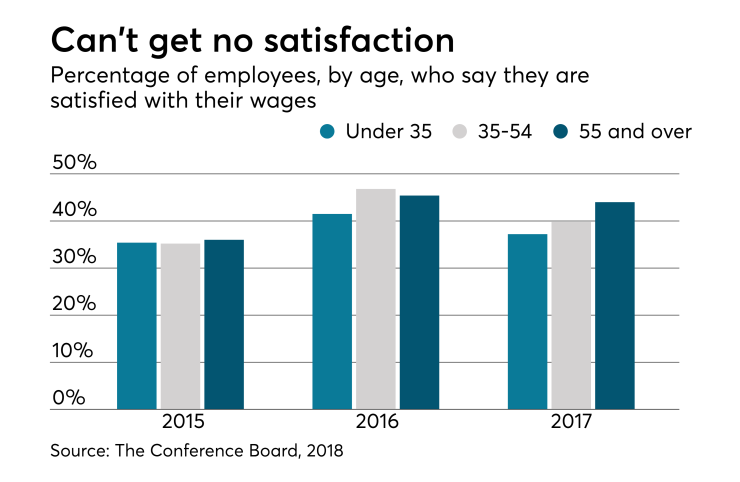NEW ORLEANS — Salaries aren’t enough incentive to retain top talent. With today’s economy with record low unemployment that favors job seekers, employers are looking for new methods to increase employee job satisfaction while maintaining a healthy bottom line.
Three new compensation tactics are gaining traction in the workplace this year: cutting performance reviews, eliminating merit-based pay and greater pay transparency, according to Krystina Moustakis, talent strategist at ADP, and Hannah Walker, total reward director for OurHealth.
“People are trying to get more out of their work,” Moustakis said on Monday during this year’s Benefits Forum & Expo. “We can’t think about employee experience without thinking about benefits. It’s not just pay that’s going to keep people at their job. We have to have both.”

Moustakis and Walker referenced a 12-year study conducted by the University of Tennessee that examined the workplace habits of 3,500 employees in 43 different countries. These top three compensation trends for this year were a result of this study and their own professional experiences:
Eliminating performance reviews
Companies like Cigna, IBM and Digital Ocean are doing away with the traditional annual performance reviews, Walker said. Not only are the reviews stressful for employees, the scheduled meetings are ineffective at motivating the workforce.
Instead, Walker suggests replacing the annual reviews with continuous feedback. Employees feel supported through open communication, and performance issues can be addressed and corrected on the spot.
“When you do your work better, it makes you happier,” Walker said, at the conference sponsored by Employee Benefit News and Employee Benefit Adviser. “When you get recognized for it, you feel like you’re adding value to your team. But if an issue isn’t addressed right away, it makes you feel worse.”
Moustakis also added that annual reviews tend to create a lot of extra work for human resources and upper management. Because of this, she said many employees find themselves receiving a “satisfactory” grade during an annual review, which can lower employee morale.
“It’s like 'did you not recognize what I did all year?'” Moustakis asked. “You’re likely to see higher productivity from an employee that’s told when they perform well.”
Eliminate merit-based pay
Most employees won’t react well to losing yearly bonuses at first, but Moustakis and Walker said more companies are moving away from merit-based pay. That’s not to say they’re doing away with bonuses altogether. These companies are choosing to award them during profitable years, and withhold them during downturns.
“It helps drive performance and contain costs,” Walker said. “Sometimes an air of entitlement develops when bonuses are distributed annually, regardless of productivity.”
Moustakis also suggested distributing bonuses based on department performance is a great way to encourage productivity and teamwork. However, it’s unlikely to play out favorably if the reward for success isn’t enough to generate excitement.
“It will leave a bad taste in people’s mouths, but if you want them to feel the pain of a bad year it will be less hard of a hit when you’re good to them during the good years too,” Moustakis said. “It has to be a two-way street in today’s market.”
Pay transparency
Four years ago, social media management company, Buffer, adopted a practice used by at least three European governments — transparent salaries.
The earnings of every Buffer employee are accessible to the public through the company’s website. Walker said the company saw a surge in employee applications after this feature went live.
“They got hundreds of job applications because people feel they can trust the information they get about pay,” Walker said. “I’m not saying go post all your salary information, but transparency builds trust.”
Not only did posting salaries give Buffer a large talent pool for new hires, it ignited motivation within existing employees. Someone who earns less than their colleagues might be prompted to reflect on the reasons why, and develop a strategy to correct it.
“If I’m a mediocre worker and I find out the person sitting next to me, who’s doing same job, is making more than me, I’m going to be miffed,” Walker said. “It could motivate someone to put in more effort.”





